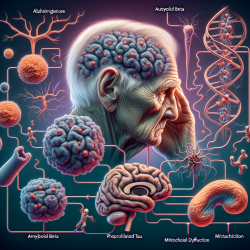Introduction
In the ever-evolving field of neurology, understanding genetic mutations and their implications is crucial for practitioners. A recent study, "Novel pathogenic COX20 variants causing dysarthria, ataxia, and sensory neuropathy," provides valuable insights into the COX20 gene's role in neurological disorders. This blog aims to help practitioners enhance their skills by implementing the research outcomes or encouraging further investigation.
Understanding COX20 Variants
The COX20 gene encodes a mitochondrial complex IV assembly factor essential for COX2 activation. Variants in this gene have been linked to neurological disorders characterized by symptoms such as dysarthria, ataxia, and sensory neuropathy. The study identifies novel COX20 variants affecting mRNA splicing and protein expression, leading to these symptoms.
Key Findings and Implications
The research highlights four subjects with novel compound heterozygous COX20 mutations. These mutations alter mRNA splicing and protein expression, resulting in a unique phenotype that includes childhood hypotonia, dysarthria, ataxia, areflexia, and sensory neuropathy. The findings emphasize the importance of genetic testing in diagnosing and managing such disorders.
Implementing Research Outcomes
Practitioners can enhance their skills by incorporating these findings into their practice:
- Genetic Testing: Encourage genetic testing for patients presenting with similar symptoms to identify potential COX20 variants.
- Comprehensive Evaluation: Conduct thorough evaluations, including nerve conduction studies and MRIs, to assess the extent of neurological involvement.
- Collaborative Approach: Work with geneticists and researchers to stay updated on the latest findings and treatment options for COX20-related disorders.
Encouraging Further Research
The study opens avenues for further research into COX20 variants and their role in neurological disorders. Practitioners can contribute by:
- Participating in Studies: Engage in clinical trials and research studies to explore new treatments and interventions.
- Sharing Case Studies: Document and share case studies with the medical community to enhance understanding of COX20-related disorders.
- Advocating for Funding: Support initiatives that fund research into rare genetic disorders like COX20 deficiency.
Conclusion
The study on COX20 variants provides valuable insights for practitioners managing neurological disorders. By implementing the research outcomes and encouraging further investigation, practitioners can enhance their skills and contribute to advancing knowledge in this field.
To read the original research paper, please follow this link: Novel pathogenic COX20 variants causing dysarthria, ataxia, and sensory neuropathy.










